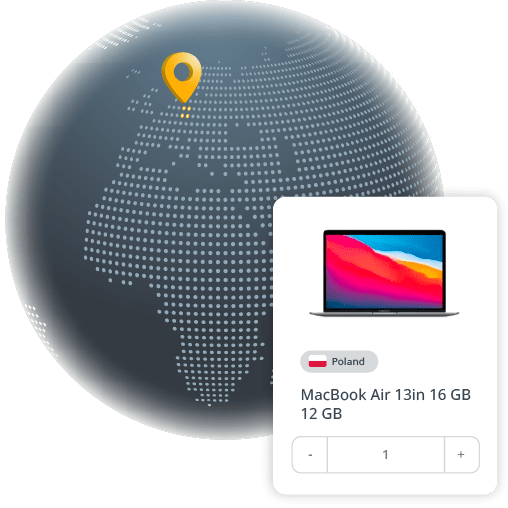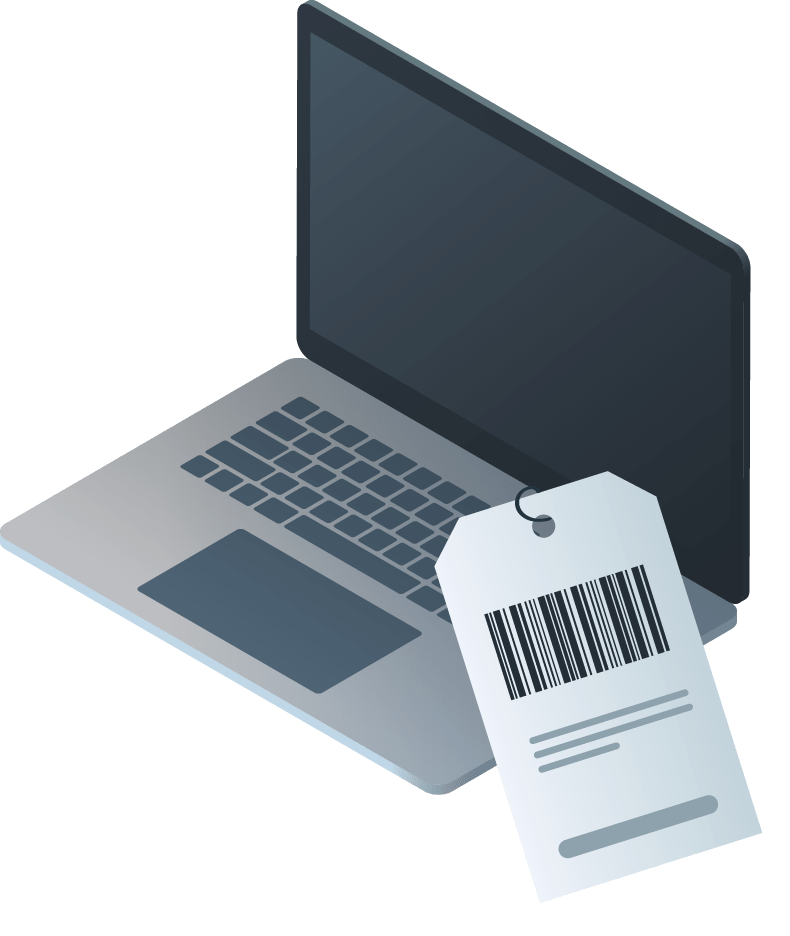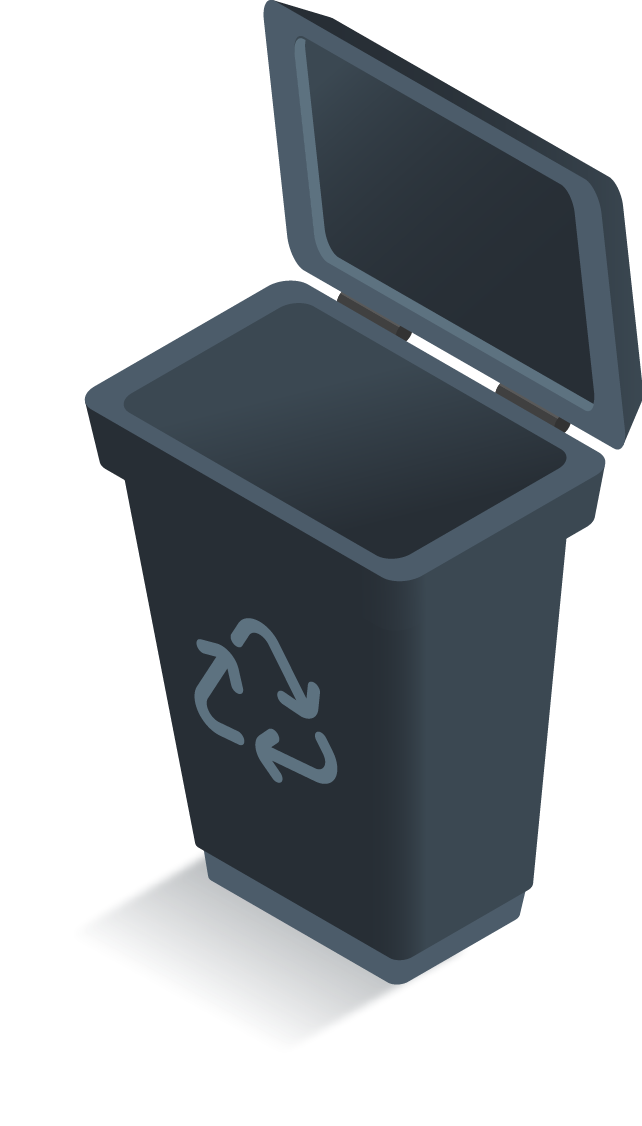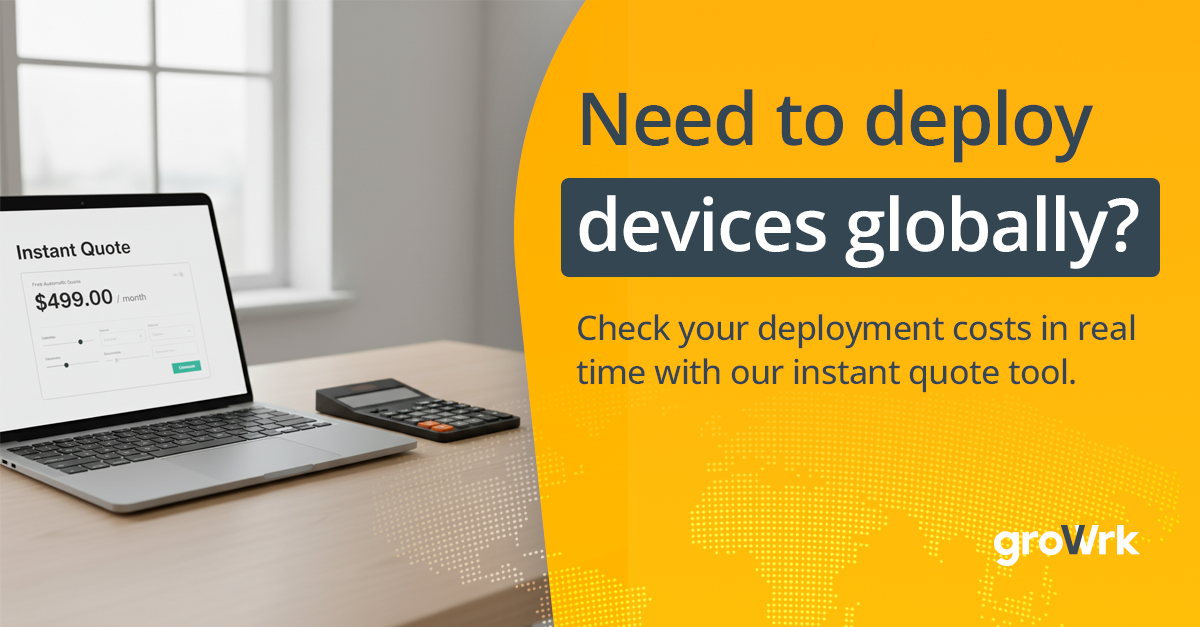How to send IT equipment to Poland
Planning to ship IT equipment to your remote teams in Poland? GroWrk makes cross-border IT asset management effortless. Whether it’s laptops, servers, or other essential tech, we ensure smooth delivery to Poland. Our services cover everything from logistics and customs clearance while adhering to local regulations so you can focus on your business.

At a glance
Poland's software market is projected to reach $2.44 billion by 2025, with enterprise software accounting for $1.03 billion. The IT landscape is characterized by efficiency, modern infrastructure, and growing digital adoption.
The country is making strides in sustainable IT, emphasizing green technologies and energy-efficient data management practices. With a highly skilled workforce, a strong focus on IT education, and favorable regulations, Poland is becoming a prime destination for tech startups and global enterprises.
|
CURRENCY Polish Zloty (PLN) |
OFFICIAL LANGUAGE Polish |
TIME ZONE Central European Time (CET) GMT+01:00 Central European Summer Time (CEST) GMT+02:00 during daylight saving time |
|
CUSTOMS DUTY ON ELECTRONICS 0-5% + 23% VAT Typically 0-5% customs duties and 23% VAT, with possible reductions or exemptions for certain categories of goods |
SHIPPING LEAD TIME 3-7 days (depending on location and shipping method) |
IT OUTSOURCING MARKET €8.5 billion €7.1 billion in 2024, with significant growth projected to reach €8.5 billion by 2025 |
Overview of IT operations in Poland

Digital innovation leader: Poland is rapidly advancing in digital innovation, with a significant portion of its population actively using online services. In 2025, approximately 13.25 million households are projected to have internet access at home in Poland. The country’s emphasis on digital transformation across sectors such as fintech, e-commerce, and tech startups is supported by both private and public initiatives, making it an attractive place for businesses looking to expand.
Advanced IT infrastructure: Poland's strong IT infrastructure, characterized by high-speed internet and a growing number of data centers, positions it as a key hub for cloud computing, hosting services, and international businesses looking to optimize and expand their digital operations.
Sustainability focus: Poland is dedicated to sustainability, actively working to minimize the carbon footprint of its tech sector. Government-backed initiatives and incentives are encouraging businesses to adopt eco-friendly IT solutions, paving the way for a greener future.
Skilled workforce: Poland’s focus on advancing tech education has resulted in a robust workforce of IT professionals skilled in areas like coding, software development, cybersecurity, and systems administration, offering businesses a reliable talent pool for growth and innovation.
Business-friendly environment: Poland provides a clear regulatory environment, favorable tax policies, and robust data protection laws, creating an attractive destination for global tech companies. Its open business climate encourages foreign investment and promotes international partnerships.
Strong cybersecurity framework: Poland is strengthening its cybersecurity framework with robust laws and proactive measures to safeguard digital systems, critical infrastructure, and user data against evolving threats.
Thriving tech ecosystem: Cities like Warsaw and Krakow serve as hubs for innovation and entrepreneurship, with a growing startup ecosystem supported by venture capital, government incentives, and networking opportunities that encourage tech innovation and business growth.
Shipping IT equipment to Poland: What you need to know
| Customs regulations |
It's essential to understand the country's customs regulations when shipping IT equipment to Poland. Compliance with these regulations is crucial for timely and efficient delivery.
|
| Duties and taxes |
Customs duties and taxes depend on the product's classification and value when importing IT equipment to Poland. Some exemptions may apply to specific products.
|
| Required documentation |
|
| Import restrictions |
Poland's Import restrictions are subject to EU-wide regulations and national laws, particularly for specific types of IT equipment. It is essential to know these restrictions to ensure compliance and avoid delays or penalties during the import process.
|
| New vs. Used equipment |
New equipment follows a simple process with duties and VAT, while used or refurbished items must comply with additional regulations, including the EU’s WEEE Directive, for proper disposal and recycling.
|
| Customs clearance process |
The customs clearance process in Poland requires submitting documentation, paying duties and taxes, and possibly inspecting before the goods are delivered.
|
| Penalties or fines for non-compliance |
Non-compliance with Poland’s import rules can result in fines. Failure to adhere to regulations, such as improper e-waste disposal or inaccurate customs declarations, may also lead to legal consequences and further penalties.
|
Checklist for sending laptops to Poland
When shipping laptops to Poland, it’s important to follow a few best practices to ensure the process goes smoothly, and your equipment arrives safely and on time. Here are some helpful shipping tips:

Select trusted couriers: Choose reliable couriers such as GroWrk, DHL, UPS, FedEx, or Poczta Polska for international shipping. These carriers offer tracking services and have experience handling Polish customs procedures.
Check service levels: Select the appropriate shipping option based on urgency. Express shipping (2-5 days) for high-priority deliveries. Standard shipping (5-10 days) for cost-effective options.
Use high-quality packaging: Secure laptops with sturdy, padded boxes and protective materials like bubble wrap, foam inserts, or air cushions to prevent damage during transit.
Disassemble where possible: If shipping accessories like chargers, docking stations, or monitors, package them separately to prevent damage. Remove detachable components if applicable.
Label clearly: Ensure the recipient’s name, address, and contact details are correctly labeled. Mark the package as "fragile" to encourage careful handling.
Accurate product descriptions: On the commercial invoice, provide a detailed and accurate description of the laptop, including its brand, model, and serial number. Inaccurate descriptions may cause customs delays.
Value declaration: Declare the correct value of the laptop to avoid under- or over-declaring, which could lead to customs inspections or fines. The declared value determines any applicable duties and taxes.
Customs declarations: Since Poland is in the EU, shipments from within the EU do not require customs clearance. However, for shipments from outside the EU, include: EU Single Administrative Document (SAD), commercial invoice, and packing list
Proof of origin: If applicable, include a certificate of origin to determine eligibility for preferential trade agreements, which may reduce duties.
Understand import duties & taxes: Laptops are duty-free under the EU tariff classification but are subject to 23% VAT on the declared value, including shipping costs.
Pre-pay duties and taxes: Some couriers allow for pre-paid duties and taxes to simplify customs clearance and prevent the recipient from facing unexpected charges upon arrival.
Protect against loss or damage: Consider purchasing shipping insurance for high-value laptops to protect against loss, theft, or damage during transit.
Compliance with Polish regulations: Ensure compliance with EU electronic safety standards, including CE marking, WEEE (Waste Electrical and Electronic Equipment), and RoHS (Restriction of Hazardous Substances) regulations before shipping.
Use tracking tools: Major couriers provide real-time tracking—monitor shipments closely to anticipate customs clearance updates and delivery progress.
Stay in touch with the recipient: Notify the recipient about the expected delivery timeline, tracking updates, and any customs-related requirements to avoid delays.
Expect weather and seasonal delays: Winter weather and peak shipping periods (e.g., Christmas, Black Friday, Polish public holidays) may cause delivery delays. Plan shipments accordingly.
Polish domestic delivery options: For final delivery, consider working with Poczta Polska, InPost, DPD Poland, or GLS Poland for efficient last-mile distribution.

Average cost of IT Equipment in Poland
Laptops (Business Grade):
- Mid-range: PLN 2,000 - PLN 4,500
- High-end: PLN 4,500 - PLN 9,000
High-end models such as Apple MacBook Pro, Dell XPS, and Lenovo ThinkPad are priced on the higher end.
Monitors (Business Grade):
- Standard: PLN 700 - PLN 1,500
- Ultrawide/4K: PLN 2,000 - PLN 4,000
Monitors from trusted brands like Dell, Samsung, and LG typically range within these prices, with 4K or ultrawide models costing more.
Desktops (Business Grade):
- Standard Desktop PC: PLN 2,000 - PLN 7,000
- Workstation Desktop (for high-performance tasks): PLN 7,000 - PLN 18,000+
Prices depend on the brand and specifications, with options from HP, Lenovo, and Apple among the most common.
Printers (Laser):
- Standard Office Printers: PLN 600 - PLN 2,000
- High-Volume Printers: PLN 3,000 - PLN 9,000
Leading brands such as HP, Canon, and Brother offer a wide range of models for office environments.
Public holidays & IT work hours to plan your shipment
-
Key public holidays in Poland:
- New Year’s Day – January 1
- Easter Sunday – Date varies (typically April)
- Easter Monday – The Monday after Easter Sunday
- Labour Day – May 1
- Constitution Day – May 3
- Corpus Christi – 60 days after Easter (date varies)
- Assumption of the Virgin Mary – August 15
- All Saints' Day – November 1
- Independence Day – November 11
- Christmas Day – December 25
- Boxing Day – December 26
Typical work hours for IT professionals
- Standard Workweek
- In Poland, the standard workweek typically consists of 40 hours, with employees generally working from 8:00 AM to 4:00 PM or 9 AM to 5 PM, Monday through Friday.
- Many businesses, especially in the IT sector, support flexible work hours, allowing professionals to adjust their start and end times to suit personal preferences as long as they meet the required 40 hours.
- Overtime
- Overtime in Poland is regulated by law and is generally restricted. When overtime is necessary, employees are entitled to additional compensation, either in the form of extra pay or additional time off. The working time should not exceed, on average, 48 hours in the applicable settlement period.
- The standard overtime pay is usually set at a rate of 1.5 times the regular hourly wage, and for work on weekends or public holidays, the rate can increase significantly depending on company policies and industry norms.
- Public Holiday Work
- Poland observes several public holidays throughout the year, such as New Year’s Day, Independence Day, and Christmas. On these days, many IT professionals enjoy time off, as offices often close or operate with reduced hours.
- If an employee is required to work on a public holiday, they are usually compensated with either holiday pay at a premium rate or additional time off to be taken at a later date. This ensures that working on holidays is recognized and appropriately rewarded.
What to consider when retrieving IT equipment from employees in Poland
| Local delivery and logistics services |
|
| Inventory management |
|
| Logistics challenges for remote locations |
Shipping IT equipment to remote locations in Poland can present unique logistical challenges due to varying infrastructure and access to transport networks. Several factors must be carefully considered when planning shipments to less accessible areas. These include:
|
| Equipment agreement with employees |
|
How to dispose of IT equipment in Poland
Data wiping
- Data wiping: Use certified software to thoroughly erase all data from hard drives, SSDs, or any other storage devices before disposal. This ensures that sensitive information is securely wiped and cannot be recovered.
- Shredding and destruction: For enhanced security, physical destruction of storage devices, such as shredding or crushing, guarantees that no data can be retrieved from the equipment.
WEEE compliance (Waste Electrical and Electronic Equipment Directive)
- Certified e-waste disposal: To meet Poland's environmental standards, companies must use certified e-waste disposal services that comply with the European Union's WEEE Directive. These services ensure the safe dismantling of equipment, with hazardous materials like batteries or mercury being responsibly disposed of.
- Recycling centers: Small electronics can be taken to designated recycling centers, while larger IT assets like servers or office-wide equipment often require specialized disposal services.
Repurposing IT equipment
- Donation to charitable organizations: Many schools, non-profits, and community groups in Poland accept donations of functional IT equipment. Donating the devices to such institutions can be an excellent way to repurpose equipment if it is still in good condition.
- Internal repurposing: If your company frequently upgrades its IT assets, consider reusing older equipment for non-critical tasks within the organization or distributing it to different departments that may have lower technological needs.
Manufacturer take-back programs
Many IT equipment manufacturers in Poland provide take-back programs, allowing businesses to return old devices for recycling or repurposing. These programs ensure responsible disposal and help organizations comply with local environmental regulations.
Certified e-waste recycling providers
Choosing third-party disposal services certified by the Chief Inspectorate of Environmental Protection or other relevant authorities is essential. These providers will handle the recycling and necessary legal documentation, ensuring that the disposal process meets environmental standards and that your company can receive certificates of destruction or recycling as proof of proper disposal.

Local IT Outsourcing Solutions in Poland
You can streamline your IT logistics and asset management with GroWrk’s comprehensive global solution. Whether it’s shipping equipment or managing IT assets across multiple regions, GroWrk helps you stay compliant and efficient, every step of the way. Here’s why GroWrk is the ideal partner for managing your IT assets in Poland:

| 1. Wide global coverage |
GroWrk provides a seamless IT outsourcing experience in over 150 countries, including Poland. With a deep understanding of the local market, we ensure that your teams in Poland benefit from customized solutions that adhere to Polish regulations and industry best practices. |
| 2. End-to-end asset management |
From procurement to disposal, GroWrk streamlines the entire IT asset lifecycle. Our hands-on management of your equipment means that your teams can focus on what matters most—growing your business—while we take care of your IT infrastructure in Poland. |
| 3. Intuitive platform for easy deployment |
Our platform offers a simplified way to deploy IT assets, track their usage, and monitor shipments in Poland. By consolidating all aspects of asset management, we eliminate logistical complications and ensure greater operational efficiency for your teams. |
| 4. Smooth delivery and equipment retrieval |
GroWrk handles the smooth delivery of IT equipment, such as laptops, to employees across Poland. We also ensure the quick and cost-effective return of equipment when employees leave the company, taking the stress out of the process. |
| 5. Compliance with Polish import regulations |
GroWrk ensures that every shipment complies with Polish import regulations, customs procedures, and tax rules. From managing VAT to addressing import duties, we ensure your IT equipment is delivered without compliance issues, saving you from costly delays. |
| 6. Efficient repairs and maintenance |
We provide efficient repair and maintenance services to keep your IT devices in optimal condition. GroWrk minimizes downtime by handling repairs promptly so your teams in Poland can remain productive. |
| 7. 24/7 Support for peace of mind |
Our expert customer support team is always available to address any questions or concerns related to asset management, logistics, or shipping. Whether you need assistance during business hours or after, GroWrk is here to support your IT operations in Poland at any time. |
Procure, configure, and deploy your IT devices from one platform


